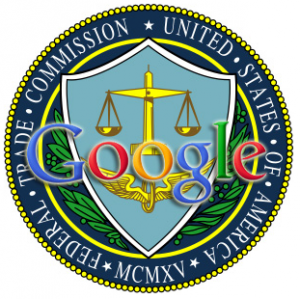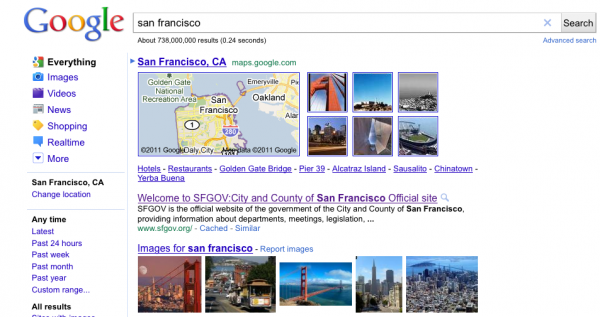FTC’s Google Probe Will Probably Come Away Empty Handed
On Friday Google confirmed that the FTC had launched a broad — really broad — investigation into its search and ads businesses seeking to determine whether the company was doing anything anti-competitive in the market. The news was immediately welcomed by some Google critics and competitors who believe the company is systematically abusing its power […]

The investigation was expected and comes as no surprise to anyone. It’s important to remember that the FTC investigation is just that: an investigation and not a formal case. However the action is an unwelcome development for Google and means that the company now confronts three formal antitrust inquiries on two continents, the other two being one by the Texas Attorney General’s office and the European Commission.
FTC Inquiry Extremely Broad
Google filed the following statement on Friday acknowledging the FTC investigation:
“On June 23, 2011, Google Inc. received a subpoena and a notice of civil investigative demand from the U.S. Federal Trade Commission (FTC) relating to a review by the FTC of Google’s business practices, including search and advertising. Google is cooperating with the FTC on this investigation.”
I have heard privately that the information the FTC wants is extremely broad and seeks to identify all persons with any degree of control or input into Google’s search algorithm. The agency is reportedly also seeking the dates and nature of algorithm changes over a period of years. That represents many thousands of tweaks, updates and Pandas over time.
One might call it a “fishing expedition,” as they say in the law. And if this were a civil case involving private litigants you’d probably see objections based on breadth and “burdensomeness.” Regardless I believe the FTC’s investigation, however broad, probably won’t turn over any incriminating facts or evidence and that a formal antitrust case against Google is unlikely.
The Parade of Abuses
Google responded to the FTC inquiry by saying in essence it focuses exclusively on consumers and building a better search experience. Very interestingly the company served up the friendly and credible Matt Cutts as a company spokesman to Bloomberg TV instead of a member of the in-house legal team. (Perhaps that’s why.)
Opponents claim Google abuses its market-leading position in a variety of ways. (Scott Cleland has devoted himself to making this case.) Here’s a small taste of the parade of alleged abuses: “scraping and using other companies’ content without their permission, deceptive display of search results, manipulation of search results to favor Google’s products, and the acquisition of competitive threats to Google’s dominance.”
These aren’t the only claims by critics, some of whom have also argued that Google fixes AdWords pricing or seeks to block ads for competitive services. Microsoft has some additional, specific complaints about AdWords policies as well.
Investigation to Focus on Ads Pricing, Universal Search
While there’s a potentially wide swath for investigation, given all of the above, the FTC inquiry is likely to focus on organic search rankings and any AdWords price or position manipulation. On the question of AdWords manipulation or competitive ad blocking I have no specific ability to comment. I’m not a search marketer but I’ve seen no evidence of the claimed price manipulation over the years — though perhaps they’re really talking about manipulation of ad-quality scoring.
Beyond the call for more transparency about organic ranking factors, one of the loudest and most persistent complaints is that Google gives its own properties preferred placement in results. This is unfair according to competitors who receive less traffic. It is “unfair” in the sense that the more Google puts “answers not links” at the top of the page the more the third party links get pushed down below the fold.
But can Google do this or is this some sort of abuse of Google’s search dominance? I wrote about this issue at some length last year: Once Again: Should Google Be Allowed To Send Itself Traffic?
In that post I cite the SearchKing case in which the court held that search results and Google’s search algorithm were “opinion” and as such entitled to First Amendment protection. This is a US District Court case and would not be “controlling authority” in other jurisdictions but certainly would be persuasive to other courts.
Substantively this ruling would appear to dispose of the issue about whether Google can send traffic to its own properties.
Bing, Yahoo Send Traffic to Themselves Too
In addition, Google’s main rivals Bing and Yahoo provide links to their properties in many instances the same way that Google does. For example, compare a search for “San Francisco” across all three engines; the results look quite similar:
I would be surprised if the FTC were to take the position that Bing and Yahoo can refer traffic to their own properties but Google cannot. As a policy matter we wouldn’t want the US to regulate any search engine’s ability to experiment or create new types of SERPs using its own content. We wouldn’t want the government to get involved in regulating what appears on the SERP or where. Yet this is the implication of the argument that Google shouldn’t be permitted to favor its own sites in search results.
As a practical matter if Google were to show only results from its own properties users would ultimately defect to other engines.
However it’s not at all clear to me (admittedly I’m not an antitrust expert) whether some provision of antitrust law could overcome the SearchKing holding that SERPs are subject to First Amendment protection. I’ll assume however there would be a way if there were a formal judicial finding that Google was a monopoly or had otherwise violated antitrust law.
Google critics argue that Google is a de facto monopoly and that consumers, as a practical matter, don’t have choice. I disagree. By the same token I believe the oft-repeated phrase “the competition is just a click away” is more a rhetorical device than a statement of reality. Consumers have clearly embraced the Google “habit” and are loathe to change.
Is Google a “Utility”?
The way that Google sees and publicly presents itself and the way that other publishers see Google have diverged over time. Google says it’s just one search engine among others. Many publishers, by contrast, see Google as a force that holds the power of life and death over their sites. And many have argued that Google is the only meaningful source of traffic and thus essential to their businesses. Indeed, Google visibility is essential but that doesn’t mean that there aren’t alternatives for consumers and publishers.
According to comScore, Google’s market share in the US stands at 65.5 percent, which was up a tenth of a point from the previous month. Bing and Yahoo combine for roughly 30 percent of the market. In Europe Google is much more dominant than in the US. But in the US Bing has been growing and gaining share slowly. The combination of Yahoo and Bing (30 percent) controls a meaningful share of search traffic and undermines the claim that consumers have no choice or are not exercising any choice.
Regulating the SERP
While I assume that ultimately FTC’s not going to find anything to hang a a formal case on let’s assume that it will for purposes of argument. What’s the remedy? Fines are not going to be meaningful. What competitors want is some sort of oversight of Google but more specifically to limit Google’s discretion over its own SERP.
As I’ve pointed out the notion of “regulating the SERP” is troubling. It’s legally problematic and otherwise undesirable. Are competitors really going to argue that the government should be involved in determining how sites are ranked or, in effect, what parts of the Google SERP are given to stakeholders? Google doesn’t owe a duty to specific publishers or competitors and they don’t “own” parts of the SERP.
The logic of SERP regulation would produce a version of this: Google gets a box at the bottom of the page (below the fold) for its own sites, top publishers in any given vertical get the “middle” of the page based on their traffic and newer sites or startups, which fall below a certain traffic threshold, get another area of the site.
The absurdity and impracticality of this are obvious and nobody is going to come out and advocate it explicitly.
Rather than regulating the SERP any proposed remedy (or settlement) would probably be “procedural” in nature. It could involve periodic review by the government and a complaint process for competitors. The models that come to mind are the 20 years of privacy audits imposed by the Buzz settlement or the recently approved ITA acquisition, which provides “a formal reporting mechanism for complainants if Google acts in an unfair manner.”
FTC Investigation a “Do-Over”?
A convergence of interests and circumstances led to the FTC complaint. Google has become dominant in numerous market segments and the company is perceived by many to be arrogant. Many legislators and corporate leaders now believe Google has too much power period. The “network effect” and “economies of scale” keep Google in a leadership position in search (and online ads) and block out some competitors without comparable resources and reach. But the company is also where it is because of execution and some key acquisitions.
Yet at almost every step of the way, the FTC or US Justice Department have reviewed and approved acquisitions like DoubleClick, AdMob and most recently ITA, among other companies. There may be regret about some of those approvals, so this new investigation represents a “do-over” of sorts for the FTC.
I’m not uncritical of Google and I believe there are instances where the company could well have “crossed the line” (e.g., in its dealings with Skyhook Wireless). But I don’t believe that Google has manipulated ad pricing or search results to punish competitors. And the notion of limiting or regulating what Google can show on its SERPs is a bad idea.
Antitrust law is not supposed to protect companies from competitors but protect the marketplace in general and consumers in particular. Right now there’s no evidence that Google has harmed consumers. And the booming startup market suggests that innovation hasn’t been adversely affected by Google’s rise.
There’s a policy debate to be had about what happens when a company, through market competition and successful execution, becomes so dominant that it seems unassailable. It seems that is the policy discussion we’re having now indirectly and through the distorted lens of antitrust.
Opinions expressed in this article are those of the guest author and not necessarily Search Engine Land. Staff authors are listed here.
Related stories



